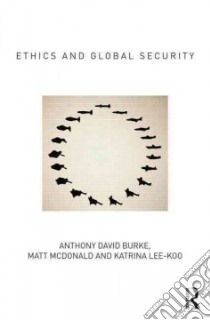Ethics and Global Security - 9780415810012
Un libro in lingua di Anthony Burke Katrina Lee-koo Matt Mcdonald edito da Routledge, 2014
- € 44.70
- Il prezzo è variabile in funzione del cambio della valuta d’origine
This book will be the first systematic examination of the role that ethics plays in international security in both theory and practice, and offers the reader a concrete ethics for global security.
The text has three goals: (1) to explore the ethical assumptions and implications of paradigms and practices of national and international security; (2) to investigate the key ethical issues and dilemmas generated by dominant international norms and contemporary international security arrangements; and (3) to advocate ways that we should think about and practice security in international relations. It advances a concrete prescriptive ethics for a more stable, just, and inclusive global security order. This achieved through an illumination of how theories and practices of security are underpinned by ethical commitments or assumptions and have important ethical implications. Thus, the most mundane practices associated with international security, from patrolling a territorial border to maintaining armed forces, all proceed from first- order assumptions about who is in need of protection and what rights and responsibilities exist in providing that protection. These practices also—crucially—have important ethical implications, not least in terms of excluding some from consideration, presenting others as potential threats, and licensing particular actions. And as a first order concern of governments, security practices can also afford higher priority to some concerns (e.g. the preservation of territory or national security) but not others (e.g. the provision of healthcare, education or environmental protection), despite the centrality of the latter for survival and the capacity to make life choices. In short, while many scholars and practitioners of security claim little or no interest in ethics, ethics clearly has an interest in them. There is an urgent need, therefore, to explore the ways in which contemporary international security frameworks and practices proceed from ethical commitments/assumptions and entail important ethical implications. Pockets of these concerns (just war, for example) have already received significant scholarly attention and benefit from a highly developed ethical system. Other dimensions of global life—in particular the theory and practice of security—have been sorely neglected. Ultimately, this book explores the relationship between security and global ethics, while making a case for a cosmopolitan approach to the theory and practice of security that is sensitive to the possibilities and dangers associated with linking security and progress. This book fills an important gap in the literature and will be of much interest to students of ethics and IR, security studies, foreign policy, and politics and international relations,in general.
Informazioni bibliografiche
- Titolo del Libro in lingua: Ethics and Global Security
- Lingua: English
- Autori : Anthony Burke Katrina Lee-koo Matt Mcdonald
- Editore: Routledge
- Collana: Routledge (Paperback)
- Data di Pubblicazione: 07 Luglio '14
- Genere: POLITICAL SCIENCE
- Pagine: 218
- Dimensioni mm: 233 x 154 x 0
- ISBN-10: 0415810019
- EAN-13: 9780415810012


